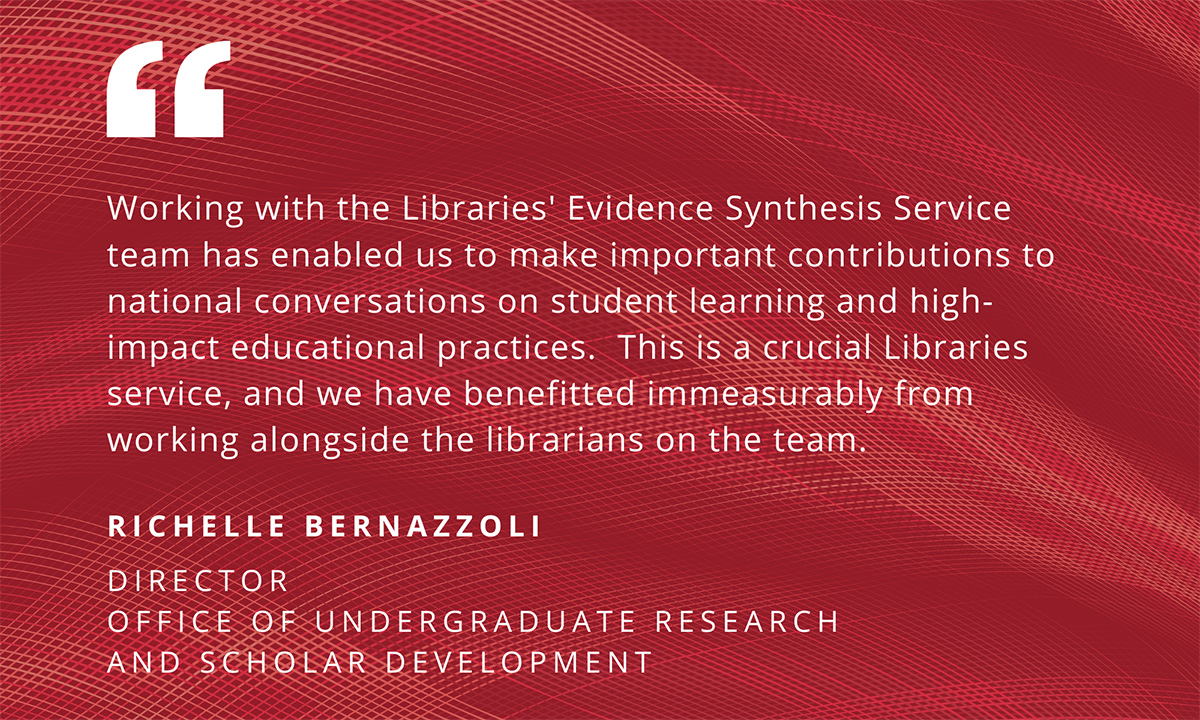
The University Libraries’ Evidence Synthesis Service team has offered their expertise to a number of complex, long-term projects taking place across campus. Director of the Office of Undergraduate Research and Scholar Development Richelle Bernazzoli first engaged with the team during an evidence synthesis introductory workshop in 2021. Shortly after, she reached out with an idea for an initial project exploring undergraduate researchers participating in mentored research, and how that experience serves to develop their research identities.
Open Science Program Director and Librarian Melanie Gainey and Engineering Librarian Haoyong Lan joined the project as collaborators, and dove into the existing research. While they worked, Bernazzoli proposed another idea, this one focused on reflective practice for both undergraduate and graduate students. Gainey and Librarian Ryan Splenda joined this effort, along with Korryn Mozisek, special faculty in English and Office of the Vice Provost for Education, and Kim Piatt, director of experiential learning at Dietrich College.
As a part of these teams, the librarians were able to provide support throughout the research process from research question refinement to data collection and management, helping the collaborators successfully explore evidence-based practices in higher education.
Goals
- Complete a scoping review addressing the following topic: researcher identity development among undergraduate students participating in mentored research in academic settings.
- Complete a second scoping review about the use of reflective practice in higher education undergraduate and graduate pedagogical settings.
- Use this research to create meaningful undergraduate research experiences for students, as well as a bank of training resources available to national audiences.
How We Helped
- For the undergraduate researcher identity project, Gainey and Lan helped design, run, and manage database and gray literature searches, advised and trained the research team on screening methods and software, and provided reproducible documentation of the searches for publication.
- Gainey and Splenda helped teach a small group of Summer Undergraduate Research Apprenticeship (SURA) students who joined the reflective practice project. They provided students with an overview of evidence synthesis methodology and trained students on several aspects of the project, including developing and refining inclusion and exclusion criteria, title and abstract screening, and full-text retrieval of included studies.
- Currently, the team is exploring the possible use of generative AI to assist in screening.
- The Evidence Synthesis Service team will also give guest lectures for a Grand Challenges Seminar for Dietrich College first-year students taught by Bernazzoli and Mozisek this coming fall. The course incorporates evidence synthesis methodology to study trust and mistrust in research.
Results
- A protocol preregistration for the research identity project was published on Open Science Framework (OSF) in 2023. The team plans to publish a peer-reviewed article about the project in an education journal in 2025.
- A protocol is currently being written for the reflective practice scoping review project that will be published on OSF in 2024. The team also plans to publish a peer-reviewed scoping review article in an education journal in the future.
- The reflective practice scoping review project was presented at both the Eberly Center’s Teaching & Learning Summit in September of 2023 and at the American Association of Colleges & Universities Annual Meeting in January of 2024. These presentations focused on including SURA undergraduate researchers as part of an evidence synthesis research project, and showcased how involving students in evidence synthesis can support their learning, including research and information literacy.
- The project has also been accepted to the Council on Undergraduate Research ConnecUR 2024 conference, which will take place in June 2024.
- Both projects provide key examples of how the Evidence Synthesis Service team can work with administrative units on campus to develop research projects that support evidence-based practices in higher education. These projects have the potential to influence educational and curricular design in higher education contexts beyond CMU.
